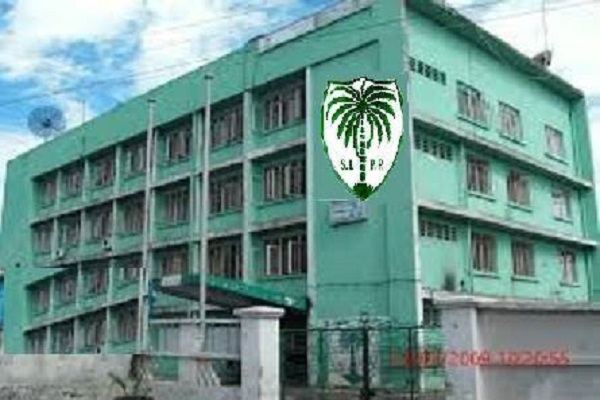The main opposition SLPP has declared that Sierra Leone is no longer under any State of Public Emergency.
The party said it holds the view that the country is not under any State of Public Emergency within the meaning and scope of the provisions of Section 29 of the Constitution of Sierra Leone 1991.
A press release issued by the main opposition and signed by its Chairman and Leader stated nine reasons for holding the view that the country was no longer under the State of Public Emergency, among which it stated that the initial declaration on 7th August 2014 of the State of Public Emergency by President Koroma had duly lapsed.
On August 6th, 2015 President Ernest Bai Koroma proclaimed another State of Public Emergency throughout the country, although he relaxed most of the restrictions contained in the State of Public Emergency declared as a result of the Ebola Virus. The President’s declaration has been challenged by Lawyer Charles Margai.
See full text of the SLPP’s statement below.
SIERRA LEONE PEOPLE’S PARTY
PRESS RELEASE BY THE SIERRA LEONE PEOPLE’S PARTY (SLPP) ON FUTHER EXTENSION OF THE STATE OF PUBLIC EMERGENCY IN SIERRA LEONE
Freetown, Monday, 17th August, 2015: The Sierra Leone People’s Party (SLPP) would like to inform the entire membership of the Party and the public in general that as of this moment we hold the view that the country is not under a State of Public Emergency within the meaning and scope of the provisions of Section 29 of the Constitution of Sierra Leone 1991 (Act No. 6 of 1991). We hold this view for the following reasons.
1. That the SLPP recalls the fact that the initial declaration of a State of Public Emergency declared by the President in 2014 relative to the Ebola Virus Disease and approved by Parliament in a Resolution of 7 August, 2014 had duly lapsed on the 6th August, 2015.
2. That the new declaration of a State of Public Emergency under the Proclamation published on 6th August, 2015, contained in Public Notice No. 1 of 2015, appears to have used the language of the provisions of Section 29 (1) (b) of the Constitution.
3. That the SLPP has been reliably informed by its Parliamentary leadership that this new declaration was made by the President when Parliament was sitting and, as such, can be valid for a period of only seven (7) days beginning with the date of publication as stipulated in Section 29 (3) (a) of the Constitution. Accordingly, the SLPP considers this new declaration to have lapsed on the 12th August, 2015.
4. We say this because the adjourned Parliament that was reconvened on Friday, 31st July, 2015, was in fact adjourned to meet again on Tuesday, 4th August, 2015, but that meeting never took place and that since that meeting on Friday, 31st July, 2015, Parliament has not been properly adjourned. In this connection, we refer to Section 171 of the Constitution which defines the word “sitting” to mean “a period during which Parliament is sitting continuously without adjournment including any period during which Parliament is in committee”
5. That the SLPP is further of the view that, in the event that the President declares yet another State of Public Emergency, so long as the sitting of Parliament remains extant, such fresh declaration cannot be valid after the statutory seven (7) days. And should Parliament be reconvened to pass any Resolution to approve or supersede such further declaration by the President, such a Resolution can only be valid if passed by the votes of two-thirds of the entire Parliament whose current membership stands at 123 members (ie 111 elected MPs and 12 Paramount Chiefs). In other words, the Resolution must receive the support of not less than 82 Members of Parliament.
6. The SLPP maintains its view that for those isolated cases remaining in the very limited areas still afflicted by the scourge of Ebola, it is plainly not justifiable that the Government should put the whole country once again under the unbearable weight of a State of Public Emergency. The SLPP wishes to reiterate most emphatically its position that for those limited areas still afflicted by the Ebola Virus, the existing relevant legislation is sufficient for any administration to be able to put adequate management mechanisms in place to combat and finally eradicate the virus from those limited areas rather than having recourse to yet another draconian State of Public Emergency covering the entire country under Section 29 of the Constitution.
7. The SLPP is fully appreciative of the announcement by the President in his Broadcast to the Nation on 6th August, 2015 of his lifting of some of the restrictions previously imposed upon the citizenry. We now call upon the President to also consider lifting the remainder of the emergency restrictions without further delay so that an enabling environment can be created for normalcy to return to the country as a whole and for peaceful ordinary men and women to be able to fend for their families and to put food on their table amidst the enormous challenges they face from the excruciating economic conditions in the country.
8. Lastly, the SLPP is not unaware of the unenviable predicament facing President Koroma. Whichever way the judgment goes in the constitutional cases spawned by the sacking of the elected Vice-President of the Republic currently before the Supreme Court, it is foreseeable that there could be grave repercussions from the results of the trial. Be that as it may, it cannot and does not justify subjecting the entire country to endless State of Public Emergency. However, it does underscore, perhaps, more than anything else, the centrality of the principles of respect for the rule of law and constitutionality in securing the peace, order and good government in a fragile democratic polity like Sierra Leone.
Chief Bai Sebora Somanoh Kapen III
National/Chairman/Leader
Sierra Leone People’s Party











